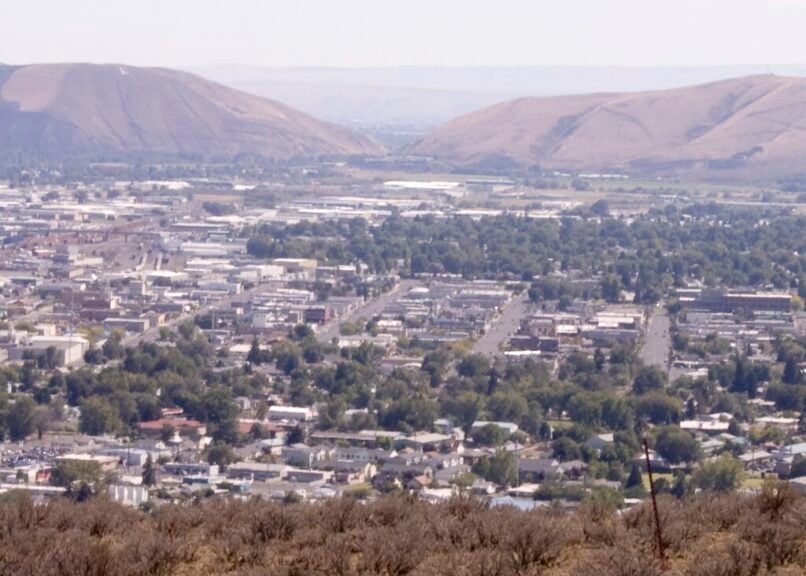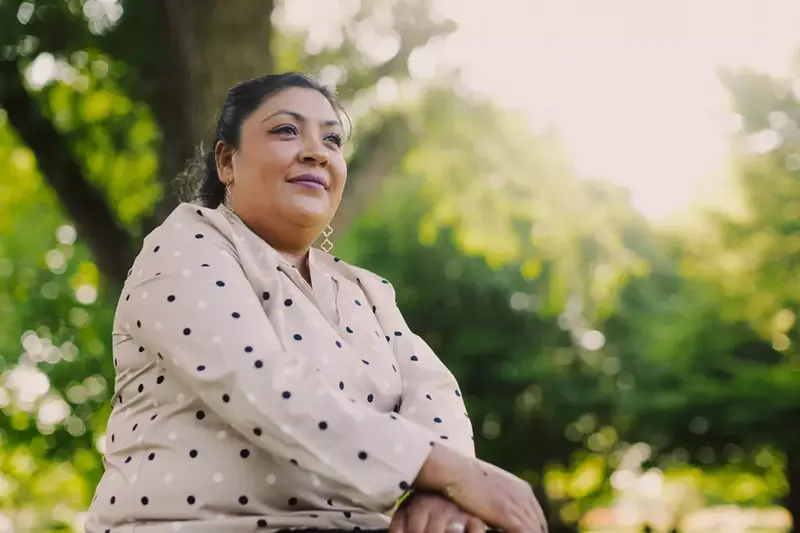Marlen, a 35-year-old mother from Mexico, knows what farmworkers like her are supposed to do if they’re sexually harassed on the job: Tell the harasser to stop, document it, then report it to company leadership.
If none of that works, get legal help. This could mean filing a complaint with the U.S. Equal Employment Opportunity Commission, the government agency responsible for enforcing federal employment discrimination laws.
Marlen leads training sessions in Spanish for other Latina farmworkers in Central Washington about sexual harassment, following guidance drawn from the EEOC. In agricultural areas like Yakima County, where more than half the population is Hispanic or Latino, many victims are immigrants who speak little English while many perpetrators are supervisors with the power to punish those who report them or refuse their demands.
So at the end of 2023, when Marlen’s supervisor at a large fruit farm in the Yakima Valley started leering at her, making crude comments about women’s bodies like “nice camel legs,” and filming her as she stood on a ladder cutting tree branches, she reported it to a manager, she said.
Then she was assigned to more physically demanding jobs, such as digging holes in rocky ground and moving heavy wooden posts — work that typically only men would do and that isolated her from co-workers, according to her documentation of the incidents.
“It makes me feel like it was wrong of me to report him,” Marlen said in Spanish. She asked to go by her first name for this article because she still works for the company. “Like I made a mistake, when the one who made the mistake was him.”
But if things get worse for Marlen, she probably wouldn’t report it to the EEOC, the commission that for nearly three decades has defended immigrant farmworkers like her against workplace sexual harassment and abuse — no matter their immigration status.
“What are they going to do with the information we give them? Are they going to help us or make things worse for us?” she said. “I feel like — not just in cases of harassment, but with anything happening with someone right now — people won’t report it because of fear.”
As the Trump administration’s immigration crackdown reaches into agricultural communities across the country and the EEOC shifts priorities to align with those of the president, it’s unclear to these farmworkers and their attorneys whether the agency will continue to protect them.
In one of several actions contributing to a growing fear that the EEOC is being politicized by President Trump, the commission’s Trump-appointed acting chair, Andrea Lucas, announced in February that the commission will help deter illegal migration by enforcing employment antidiscrimination laws against employers that “illegally prefer non-American workers.” And in the name of protecting women from workplace sexual harassment, Lucas also vowed to roll back the Biden administration’s “gender identity agenda.” The commission then moved to dismiss several lawsuits against companies alleging discrimination against transgender and nonbinary workers.
The commission declined to comment when InvestigateWest asked if workers can continue filing complaints without fear that their immigration status will be used against them.
“The EEOC was playing a very critical role in being able to protect survivors of workplace sexual harassment, including egregious rape. The sense that we’re getting is that they’re no longer going to be that kind of an agency,” said Blanca Rodriguez, deputy director of advocacy for Columbia Legal Services, a nonprofit legal aid program in Washington. “They’re going to be an agency that immigrant communities are going to fear. And that is not only going to do harm during the Trump administration, but for years to come.”
While it’s unclear whether the federal commission would in fact share people’s immigration information with other agencies like Immigration and Customs Enforcement, the uncertainty alone is deterring farmworkers from reporting sexual harassment and abuse to government and legal organizations, according to attorneys and advocates in the region.
The Northwest Justice Project, a nonprofit law firm that represents low-income people in Washington, recorded 16 cases involving sexual harassment of a farmworker in 2024. It had 21 such cases in 2023 and 17 in 2022. So far in 2025, as Trump returned to the White House, the firm has recorded only two cases (although the Northwest Justice Project cautioned this could be an undercount because the data is not yet fully entered in its system).
These cases may also take a back seat as the Washington Attorney General’s Office, an alternative to the federal government for combating sexual violence against farmworkers, spends more of its limited resources pushing back against the Trump administration’s actions, leaving these workers with few — if any — options for recourse. The state Attorney General’s Office has sued the Trump administration more than a dozen times over issues like birthright citizenship, gender-affirming care for youth, education funding and health funding.
“It’s a terrible outcome if we have to spend all of our energy responding to the federal government, and thus leaving workers in Washington without any protection because the EEOC may not do its job,” said the office’s Civil Rights Division Chief Colleen Melody. “Resources are a major concern, and burnout will be a huge concern if we don’t get additional resources to help do this work.”
‘There is no trust’
In 1991, a federal court case in California shaped the future of undocumented workers’ rights.
In a victory for immigrant rights, the judge ruled that undocumented workers are covered under Title VII, a section of the Civil Rights Act of 1964 that prohibits discrimination against employees based on national origin, race, sex and more. The ruling opened the door for millions of immigrant workers to file discrimination charges with the EEOC.
For William Tamayo, a now retired attorney who represented the plaintiff, a woman from Mexico, it was just the beginning of a trailblazing career protecting immigrants from sex-based discrimination. When Tamayo joined the EEOC as a regional attorney in 1995, the agency had never before sued an agricultural company over sexual harassment of a farmworker.
“Largely, the presence of the federal government was the immigration service. So I had to figure out, ‘How would they trust me and trust the EEOC?’” Tamayo said. “It was really hard work.”
His first major breakthrough came in 1999. One of the nation’s largest lettuce growers, Tanimura & Antle, settled a case with the EEOC involving a single mother from El Salvador who said that a hiring official forced her to have sex to get a seasonal job picking crops.
Since then, the EEOC has brought more than 50 agricultural companies to court over such allegations, primarily under Tamayo’s leadership, leading to improved sexual harassment trainings and over $35 million awarded to farmworkers throughout the country. This doesn’t include the many cases resolved through mediation and settlements before a lawsuit was filed.

Allegations range from pervasive verbal harassment to violent assaults: A woman whose supervisor held pruning shears to her throat and repeatedly raped her at a tree farm in Oregon’s Willamette Valley. Managers and employees at a California raisin company who, for over a decade, groped and demanded sex from female workers. A pregnant woman whose manager, after she rejected his almost daily sexual advances at a fruit packing warehouse in Central Washington, fired her husband and assigned her to lift 40-pound boxes without help. In most cases, the women who reported sexual violence also reported consequences for doing so — they lost their jobs, were demoted, isolated from co-workers.
Sexual harassment and retaliation are illegal under federal and state law. Yet studies estimate that 65% to 80% of farmworker women in the U.S. agricultural industry experience workplace sexual harassment. The nationwide issue, spotlighted by a 2013 PBS Frontline documentary, “Rape in the Fields,” has been especially scrutinized in California, Washington and Oregon, which have among the highest employment levels in agricultural industries of all states, according to the U.S. Bureau of Labor Statistics.
The commission’s commitment to protecting people’s immigration information is key to farmworkers’ ability to speak out about sexual abuse and harassment, according to Tamayo, who retired from the EEOC in 2021 after 20 years as a regional attorney and another six years as district director overseeing investigations across the western United States.
“Certainly, if the EEOC started asking about immigration status, that would be the end of these farmworker cases,” he said. “It has nothing to do with whether she was raped or not.”
Attorneys like Rodriguez and Michael Meuter, vice president of legal affairs and general counsel at California Rural Legal Assistance, say their farmworker clients in Washington and California are now deciding not to file sexual harassment charges with the commission. The level of fear among immigrant clients is unmatched even compared to the first Trump administration when anti-immigrant rhetoric escalated, they say.
“I think during the last administration, it was harder to get cases approved for litigation. But I think partly because Bill Tamayo — people who care about immigrant workers like him — were still at the EEOC, I still saw the EEOC conduct investigations,” Rodriguez said. “Things are completely different now. There is no trust at all in the EEOC.”
Shrinking options
Despite the successes that the EEOC had under Tamayo’s leadership, filing complaints with the commission has never been a silver bullet. Strict filing deadlines, language barriers and fear of reporting have long stood in the way of farmworkers facing sexual harassment on the job, attorneys say.
Of 8,191 sexual harassment charges resolved through the EEOC in fiscal year 2024, 26.7% were closed for administrative reasons like untimeliness, according to the commission’s enforcement and litigation statistics. Nearly half (47%) were dismissed because the commission didn’t find reasonable cause to support the discrimination claim. In Oregon, the EEOC hasn’t litigated a farmworker sexual harassment case since 2013, court records show. Reporting to the commission, however, can still prove beneficial because it preserves workers’ Title VII rights — they receive a “Right to Sue” notice when the agency closes its investigation, enabling them to file their own Title VII lawsuits.
In states with stronger worker protections like Washington, California and Oregon, farmworkers can instead take complaints to their state governments, an option that might feel safer for immigrants who distrust the current federal administration. But those routes have limitations as well.
In Washington, for example, the Washington State Human Rights Commissionenforces state law prohibiting sexual harassment. While the state commission itself doesn’t bring cases to court, it can negotiate agreements with companies and refer cases to the state Attorney General’s Office.

“We want every farmworker — regardless of immigration status, job type, or background — to know that they have the right to live and work free from sexual harassment and discrimination,” said Washington State Human Rights Commission Executive Director Andreta Armstrong in an email statement to InvestigateWest.
But workers have just a six-month window from the date of the harm to file a complaint with the state commission, and a backlog of cases means that complaints can take years to be investigated. Of 44 sexual harassment complaints against agricultural companies received by the Washington commission since 2015, just eight ended in resolutions through settlements or agreements with their employers, according to InvestigateWest’s review of data provided by the agency. Nearly 70% of cases were closed for administrative reasons or after the commission found “no reasonable cause.”
Another avenue that has proven committed to combating sexual violence against farmworkers — the Washington Attorney General’s Office — is also narrowing under the Trump administration. Since launching its civil rights unit in 2015, the office has sued five different agricultural companies on behalf of farmworkers who alleged sexual harassment or sexual abuse on the job.
Although state law protects everyone from sexual harassment, regardless of immigration or citizenship status, many farmworkers still fear that coming forward may put them at risk for attention by immigration officials, said Melody, the office’s civil rights division chief. This fear has been “noticeably true” since the 2024 election, Melody added.
“Witnesses tell us that they have a story to tell, but they’re afraid and unwilling to come forward and tell it,” she said. “They may have family members who are impacted. They may have colleagues who are impacted, and they fear that coming forward may expose any of those people to retribution.”
For immigrant farmworkers who are weighing the risks of speaking out, Melody recommends they ask questions like: Will my immigration status be necessary for this investigation? Will it be shared? With whom will it be shared?
“In the Washington State Attorney General’s Office, the answer is, ‘We almost always don’t need to know, and we don’t share it with anyone,’” she said. “I’m not sure what the answer is at the EEOC right now.”
‘Farmworker women’s voices are key’
On a Saturday morning in May, Marlen gathered with seven other women in a classroom in Sunnyside, a small city in the heart of the Yakima Valley. Over a table of tamales and coffee, they painted bandanas for the BASTA Coalition of Washington, which provides sexual harassment trainings for farmworkers in the state. They filled the white cloth with messages in Spanish and English like, “Farmworker women’s voices are key!”
The women, who each found agricultural work in Central Washington after leaving Mexico, spoke about how to weigh the importance of reporting sexual harassment against people’s fear of losing their jobs or being deported for doing so.
Marlen said the harassment she experienced in the apple orchards has improved recently, after she took some time off from work for a family matter. A few months ago, when she was being isolated from her co-workers in what she believes was retaliation for reporting her supervisor, she would’ve said she regretted reporting the harassment. But now, despite the risks, she stands by her decision.
“There comes a time when you get overwhelmed and say, ‘Why did I report it? I should’ve just kept quiet,’” Marlen said. “But if tomorrow it happens to my daughter, I feel like no — someone has to make the change.”
That decision, however, may not be right for everyone. BASTA, which means “enough” in Spanish, currently lists the EEOC as a resource for workers facing sexual harassment. The coalition’s director, Isabel Reyes-Paz, said they might need to reconsider that recommendation, or at least provide a caveat: “We don’t know what’s going to happen with the current administration. We can’t guarantee that your legal status information is protected or not,” Reyes-Paz said.
The coalition is also grappling with federal funding cuts, as grants that it had relied on to grow — like those administered by the Department of Labor to support women’s employment — are being slashed.
“What are we going to do?” one woman said in Spanish at the meeting in May. “How are we going to encourage them to seek help if we’re also thinking the same thing? We’re all afraid.”
InvestigateWest is an independent news nonprofit dedicated to investigative journalism in the Pacific Northwest. Visit investigatewest.org/newsletters to sign up for weekly updates. See our policy on third-party content published on zanyprogressive.com





